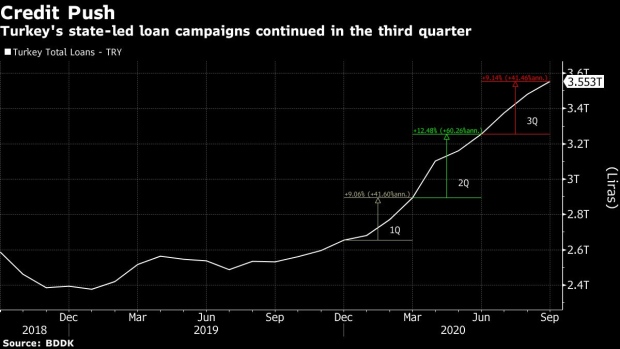Economy
Turkish Economy Fared Much Better Than Peers in Third Quarter – BNN


(Bloomberg) — Turkey’s coronavirus-battered economy fared far better than all peers in the third quarter, driven by a stimulus campaign that sacrificed the lira and price stability.
Gross domestic product last quarter rose 6.7% from a year earlier, after shrinking 9.9% in the previous three months, according to data released on Monday. The median of 14 forecasts in a Bloomberg survey was for 4.8% growth. The seasonally and working day-adjusted figures showed an expansion of 15.6% in the third quarter from the previous three months.
The $736 billion economy outperformed all Group of 20 nations including China, thanks in part to a combination of interest-rate cuts, fiscal spending and a government-led credit push.
Below are some of the highlights of the GDP report released by the state statistics institute in Ankara:
- Last quarter’s growth was driven by a rise in household consumption, which jumped 9% from a year earlier.
- Exports dropped 22% on an annual basis, after falling 36% in the preceding three months. Imports rose 16% following a 8% drop.
- Gross fixed capital formation, a measure of investment by businesses, rose an annual 23%.
To help businesses and consumers ride out the the pandemic, the Turkish government pushed banks to ramp up lending. Loan growth remained robust throughout the summer, slowing toward the end of the third quarter.
At the same time, the central bank injected liquidity by scooping up government bonds, and delivered 1,575 basis points of easing until rate cuts stopped in June, leaving Turkey’s inflation-adjusted borrowing costs among the lowest in the world. The weighted average cost of funding dropped as low as 7.34% in July, then started growing for the rest of the quarter to end at 11.1%.
With the lifting of most virus-related restrictions imposed in the previous quarter, domestic tourism gained pace, and airports were opened to most foreign tourists.
The picture for the fourth quarter is less rosy as Turkey began reimposing limitations following a virus surge and replaced its central bank and economy chiefs. President Recep Tayyip Erdogan pledged to support his new economic managers with “bitter-pill” policies that conflict with his views — but only after the currency hit record lows, keeping headline inflation in double digits. The lira has lost 24% against the dollar this year.
The central bank’s new governor, Naci Agbal, started his tenure by raising interest rates by the most in over two years, a move that could damp demand.
“The fourth quarter will point to a slower growth picture.” said Enver Erkan, an Istanbul-based economist at the Tera Yatirim investment house.
(Updates with highlights of the report in the fourth paragraph)
©2020 Bloomberg L.P.
Economy
China Wants Everyone to Trade In Their Old Cars, Fridges to Help Save Its Economy – Bloomberg


China’s world-beating electric vehicle industry, at the heart of growing trade tensions with the US and Europe, is set to receive a big boost from the government’s latest effort to accelerate growth.
That’s one takeaway from what Beijing has revealed about its plan for incentives that will encourage Chinese businesses and households to adopt cleaner technologies. It’s widely expected to be one of this year’s main stimulus programs, though question-marks remain — including how much the government will spend.
Economy
German Business Outlook Hits One-Year High as Economy Heals – BNN Bloomberg


(Bloomberg) — German business sentiment improved to its highest level in a year — reinforcing recent signs that Europe’s largest economy is exiting two years of struggles.
An expectations gauge by the Ifo institute rose to 89.9. in April from a revised 87.7 the previous month. That exceeds the 88.9 median forecast in a Bloomberg survey. A measure of current conditions also advanced.
“Sentiment has improved at companies in Germany,” Ifo President Clemens Fuest said. “Companies were more satisfied with their current business. Their expectations also brightened. The economy is stabilizing, especially thanks to service providers.”
A stronger global economy and the prospect of looser monetary policy in the euro zone are helping drag Germany out of the malaise that set in following Russia’s attack on Ukraine. European Central Bank President Christine Lagarde said last week that the country may have “turned the corner,” while Chancellor Olaf Scholz has also expressed optimism, citing record employment and retreating inflation.
There’s been a particular shift in the data in recent weeks, with the Bundesbank now estimating that output rose in the first quarter, having only a month ago foreseen a contraction that would have ushered in a first recession since the pandemic.
Even so, the start of the year “didn’t go great,” according to Fuest.
“What we’re seeing at the moment confirms the forecasts, which are saying that growth will be weak in Germany, but at least it won’t be negative,” he told Bloomberg Television. “So this is the stabilization we expected. It’s not a complete recovery. But at least it’s a start.”
Monthly purchasing managers’ surveys for April brought more cheer this week as Germany returned to expansion for the first time since June 2023. Weak spots remain, however — notably in industry, which is still mired in a slump that’s being offset by a surge in services activity.
“We see an improving worldwide economy,” Fuest said. “But this doesn’t seem to reach German manufacturing, which is puzzling in a way.”
Germany, which was the only Group of Seven economy to shrink last year and has been weighing on the wider region, helped private-sector output in the 20-nation euro area strengthen this month, S&P Global said.
–With assistance from Joel Rinneby, Kristian Siedenburg and Francine Lacqua.
(Updates with more comments from Fuest starting in sixth paragraph.)
©2024 Bloomberg L.P.
Economy
Parallel economy: How Russia is defying the West’s boycott
|
|


When Moscow resident Zoya, 62, was planning a trip to Italy to visit her daughter last August, she saw the perfect opportunity to buy the Apple Watch she had long dreamed of owning.
Officially, Apple does not sell its products in Russia.
The California-based tech giant was one of the first companies to announce it would exit the country in response to Russian President Vladimir Putin’s full-scale invasion of Ukraine on February 24, 2022.
But the week before her trip, Zoya made a surprise discovery while browsing Yandex.Market, one of several Russian answers to Amazon, where she regularly shops.
Not only was the Apple Watch available for sale on the website, it was cheaper than in Italy.
Zoya bought the watch without a moment’s delay.
The serial code on the watch that was delivered to her home confirmed that it was manufactured by Apple in 2022 and intended for sale in the United States.
“In the store, they explained to me that these are genuine Apple products entering Russia through parallel imports,” Zoya, who asked to be only referred to by her first name, told Al Jazeera.
“I thought it was much easier to buy online than searching for a store in an unfamiliar country.”
Nearly 1,400 companies, including many of the most internationally recognisable brands, have since February 2022 announced that they would cease or dial back their operations in Russia in protest of Moscow’s military aggression against Ukraine.
But two years after the invasion, many of these companies’ products are still widely sold in Russia, in many cases in violation of Western-led sanctions, a months-long investigation by Al Jazeera has found.
Aided by the Russian government’s legalisation of parallel imports, Russian businesses have established a network of alternative supply chains to import restricted goods through third countries.
The companies that make the products have been either unwilling or unable to clamp down on these unofficial distribution networks.





-



 Health14 hours ago
Health14 hours agoRemnants of bird flu virus found in pasteurized milk, FDA says
-
Art20 hours ago
Mayor's youth advisory council seeks submissions for art gala – SooToday
-



 Health18 hours ago
Health18 hours agoBird flu virus found in grocery milk as officials say supply still safe
-



 Investment19 hours ago
Investment19 hours agoTaxes should not wag the tail of the investment dog, but that’s what Trudeau wants
-



 Science23 hours ago
Science23 hours agoiN PHOTOS: Nature lovers celebrate flora, fauna for Earth Day in Kamloops, Okanagan | iNFOnews | Thompson-Okanagan's News Source – iNFOnews
-
News19 hours ago
Peel police chief met Sri Lankan officer a court says ‘participated’ in torture – Global News
-
Media14 hours ago
Vaughn Palmer: B.C. premier gives social media giants another chance
-
Art20 hours ago
An exhibition with a cause: Montreal's 'Art by the Water' celebrates 15 years – CityNews Montreal




